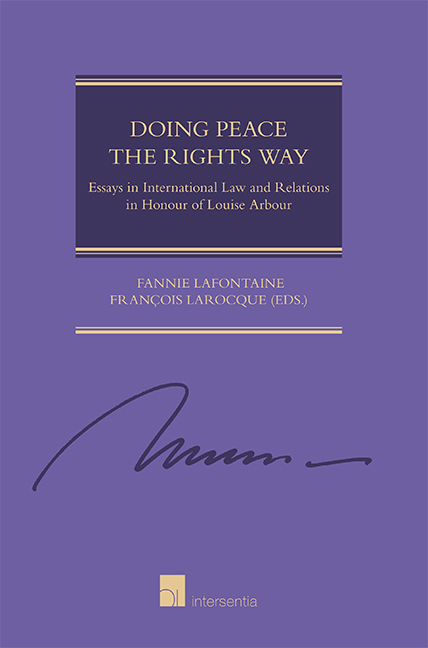Book contents
- Frontmatter
- Foreword
- Contents
- List of Contributors
- Introduction
- PART I OF FREEDOM AND EQUALITY
- PART II OF PEACE AND JUSTICE
- PART III OF WOMEN AND LEADERSHIP
- Leadership in the United Nations and the Challenge of Courage
- The World Bank as a Human Rights-Free Zone
- Come a Long Way and a Long Way to Go: UNSCR 1325 and Women's Participation in Peace-Making
- Why are Women Canada's Fastest-Growing Prison Population and Why Should We Care?
- Moving Beyond Facial Equality: Examining Canadian and French Niqab Bans
- Select Bibliography
- Appendix
- An Interview with the Honourable Madam Justice Louise Arbour
Moving Beyond Facial Equality: Examining Canadian and French Niqab Bans
from PART III - OF WOMEN AND LEADERSHIP
Published online by Cambridge University Press: 13 April 2019
- Frontmatter
- Foreword
- Contents
- List of Contributors
- Introduction
- PART I OF FREEDOM AND EQUALITY
- PART II OF PEACE AND JUSTICE
- PART III OF WOMEN AND LEADERSHIP
- Leadership in the United Nations and the Challenge of Courage
- The World Bank as a Human Rights-Free Zone
- Come a Long Way and a Long Way to Go: UNSCR 1325 and Women's Participation in Peace-Making
- Why are Women Canada's Fastest-Growing Prison Population and Why Should We Care?
- Moving Beyond Facial Equality: Examining Canadian and French Niqab Bans
- Select Bibliography
- Appendix
- An Interview with the Honourable Madam Justice Louise Arbour
Summary
We should not coerce those we wish to liberate. And it is particularly offensive to advance our fight on the backs of those women who are now among the most marginalized and whose access to the workplace is the best guarantee of both their autonomy and their integration.
Calls by politicians to ban the niqab or burqa have become commonplace. Muslim women who cover themselves using face veils, though relatively small in number, have managed to become front-page news in many jurisdictions and have regularly captured the global imagination. French President Nicolas Sarkozy stated in front of parliamentarians that the burqa is not welcome in France. Canadian Prime Minister Stephen Harper said that the niqab was “anti-women” and that it was “offensive that someone would hide their identity” ; “[it's] not the way we do things here.” The Australian Prime Minister stated that he found the burqa “a fairly confronting form of attire and frankly I wish it weren ‘ t worn.” In the United States, Germany and Canada, Muslim women have asked courts to recognize their right to wear the niqab in a variety of contexts. The niqab has been criminalized nationally in eight countries (France, Belgium, Bulgaria, Austria, Denmark, the Netherlands, Chad and the Congo), with partial or regional bans in Canada, Italy, Switzerland, Germany, Spain, Egypt, Syria, China, Cameroon, Niger and Algeria.
This chapter builds on work already written about Muslim women who wear some sort of face veil and the ongoing agitation that has been expressed about them. I have argued elsewhere that the depth of discomfort evoked by these women and their outward markers of religiosity have resulted in a wide range of mostly specious rationalizations as to why these items of clothing must be banned. Logic appears not to be a measure used when managing issues involving women who cover their faces. Rather, one sees a predisposition, often unstated, toward linking such modest clothing to radical and violent interpretations of Islam. Where such explanation is implausible, a strident dislike of the niqab manifested as an affront to national values is articulated as though that is explanation enough for the curtailment of rights. No further justification is required.
- Type
- Chapter
- Information
- Doing Peace the Rights WayEssays in International Law and Relations in Honour of Louise Arbour, pp. 443 - 462Publisher: IntersentiaPrint publication year: 2019



